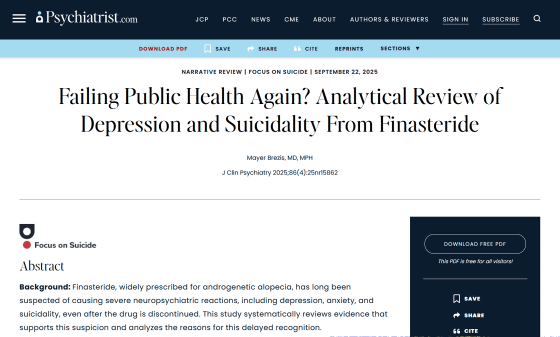A link between finasteride, a common hair loss treatment, and suicide risk has been revealed

Failing Public Health Again? Analytical Review of Depression and Suicidality From Finasteride
https://www.psychiatrist.com/jcp/analytical-review-depression-suicidality-finasteride/

Why Are We Still Ignoring the Suicide Risk of a Hair-loss Drug? | HUJI International
https://international.huji.ac.il/news/why-are-we-still-ignoring-suicide-risk-hair-loss-drug
Decades of Studies Link Suicide Risk With Common Hair Loss Treatment : ScienceAlert
https://www.sciencealert.com/decades-of-studies-link-suicide-risk-with-common-hair-loss-treatment
Finasteride has been prescribed to millions of men since the 1990s, and in some countries it is used to treat not only AGA but also benign prostatic hyperplasia , etc. However, as early as 2002 , some experts pointed out that finasteride use was associated with problems such as sleep disorders, increased anxiety, and depression.
The study's author, Meir Brezis, a former nephrologist and professor of medicine at Hadassah Hebrew University Medical Center in Israel, conducted a systematic review that combined data from eight studies published between 2017 and 2023.
The analysis showed that people taking finasteride were at significantly higher risk of experiencing mood disorders and suicidal thoughts than those not taking the drug.The data used in the analysis were obtained from national health records and data systems in several countries, including the United States, Sweden, Canada, and Israel, and were not led by Merck or any regulatory agency.

'The evidence is no longer anecdotal. We are now seeing consistent patterns across diverse populations. The consequences may be tragic,' Brezis said, raising concerns that the link between finasteride and suicide risk has been ignored for so long.
The U.S. Food and Drug Administration (FDA)
However, Brezis pointed out that given the global use of finasteride, hundreds of thousands of people may have suffered from finasteride-related depression, and thousands more may have committed suicide. He criticized the low number of finasteride-related suicides identified by the FDA, saying, 'This was not simply a lack of reporting. It was a systemic failure of drug safety oversight.'
Finasteride works by blocking the conversion of the male hormone testosterone to dihydrotestosterone , but in the process inhibits the production of neurosteroids such as allopregnanolone, which are involved in mood regulation in the brain. Animal studies have also suggested that finasteride can have long-term effects, such as neuroinflammation and changes in the structure of the hippocampus.
In addition, in some patients, the effects of finasteride may not disappear immediately even after discontinuing the drug. Reports of 'post-finasteride syndrome' have shown that symptoms such as insomnia, panic attacks, cognitive impairment, and suicidal thoughts persist for months to years after discontinuing finasteride.

Finasteride has escaped regulatory scrutiny in part because it is classified as a 'cosmetic' rather than a drug. Brezis criticized the FDA and Merck's response, arguing that the industry's silence about finasteride's harms was strategic, driven by market pressures and legal liability.
Brezis argued that drugs like finasteride should not be approved unless researchers can clearly demonstrate their safety, and that continued safety studies should be required by law even after approval.
Related Posts:
in Science, Posted by log1h_ik







